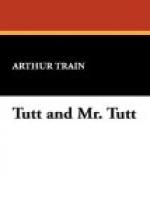“No!” answered Mrs. Appleboy firmly. “I didn’t.”
O woman!
“That is all,” declared Tutt with a triumphant smile.
“Then,” snapped Pepperill, “why did you send for him?”
“I was lonely,” answered Bashemath unblushingly.
“Do you mean to tell this jury that you didn’t know that that dog was one of the worst biters in Livornia?”
“I do!” she replied. “I only knew Aunt Eliza had a dog. I didn’t know anything about the dog personally.”
“What did you say to your aunt in your letter?”
“I said I was lonely and wanted protection.”
“Didn’t you hope the dog would bite Mr. Tunnygate?”
“Why, no!” she declared. “I didn’t want him to bite anybody.”
At that the delicatessen man poked the plumber in the ribs and they both grinned happily at one another.
Pepperill gave her a last disgusted look and sank back in his seat.
“That is all!” he ejaculated feebly.
“One question, if you please, madam,” said Judge Witherspoon. “May I be permitted to”—he coughed as a suppressed snicker ran round the court—“that is—may I not—er—Oh, look here! How did you happen to have the idea of getting a dog?”
Mrs. Appleboy turned the full moon of her homely countenance upon the court.
“The potato peel came down that way!” she explained blandly.
“What!” exploded the dealer in rubber novelties.
“The potato peel—it spelled ‘dog,’” she repeated artlessly.
“Lord!” deeply suspirated Pepperill. “What a case! Carry me out!”
“Well, Mr. Tutt,” said the judge, “now I will hear what you may wish to say upon the question of whether this issue should be submitted to the jury. However, I shall rule that the indictment is sufficient.”
Tutt elegantly rose.
“Having due respect to Your Honor’s ruling as to the sufficiency of the indictment I shall address myself simply to the question of scienter. I might, of course, dwell upon the impropriety of charging the defendant with criminal responsibility for the act of another free agent even if that agent be an animal—but I will leave that, if necessary, for the Court of Appeals. If anybody were to be indicted in this case I hold it should have been the dog Andrew. Nay, I do not jest! But I can see by Your Honor’s expression that any argument upon that score would be without avail.”
“Entirely,” remarked Witherspoon. “Kindly go on!”
“Well,” continued Tutt, “the law of this matter needs no elucidation. It has been settled since the time of Moses.”
“Of whom?” inquired Witherspoon. “You don’t need to go back farther than Chief Justice Marshall so far as I am concerned.”
Tutt bowed.
“It is an established doctrine of the common law both of England and America that it is wholly proper for one to keep a domestic animal for his use, pleasure or protection, until, as Dykeman, J., says in Muller vs. McKesson, 10 Hun., 45, ’some vicious propensity is developed and brought out to the knowledge of the owner.’ Up to that time the man who keeps a dog or other animal cannot be charged with liability for his acts. This has always been the law.




